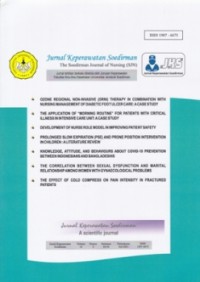
Jurnal
Prolonged Slow Expiration (PSE) and Prone Position Intervention in Children : A Literature Review
Nursing interventions to reduce the impact of respiratory problems in children aged < 24 months in inpatient rooms are not only a science but also an art. This study aimed to determine the effectiveness of Prolonged Slow Expiration (PSE) and prone position in improving respiratory function in hospitalized children aged < 24 months with respiratory distress in inpatient rooms. This literature review examined thirteen peer-reviewed journals based on inclusion criteria. The results of the review showed that PSE and prone position can reduce the respiratory frequency, maintain the neuromechanical diaphragm, and increase tidal volume. PSE was more effective at lowering the bronchiolitis scale score, preventing the child from experiencing moderate to severe respiratory distress, and decreasing relative sputum production. The prone position is more effective in increasing SaO2 even when using mechanical ventilation (MV), can increase maximal inspiratory pressure (MIP) and tissue oxygenation index (TOI), provides sleeping comfort, improves cardiorespiratory function, reduces moderate to severe respiratory distress, and can perform intubation. It can be concluded that PSE is a safe and easy therapy to administer to mild respiratory distress patients but has not a significant effect on children < 24 months with moderate to severe respiratory distress in inpatient rooms.
Availability
No copy data
Detail Information
- Series Title
-
Jurnal Keperawatan Soedirman, Vol. 16 No. 2, Juli 2021
- Call Number
-
(05) 610.5 FAK j
- Publisher
- Purwokerto : Fakultas Ilmu-Ilmu Kesehatan Universitas Jenderal Soedirman., 2021
- Collation
-
Hlm. 66-75
- Language
-
English
- ISBN/ISSN
-
1907-6673
- Classification
-
(05) 610.5 FAK j
- Content Type
-
-
- Media Type
-
-
- Carrier Type
-
-
- Edition
-
Vol. 16 No. 2
- Subject(s)
- Specific Detail Info
-
-
- Statement of Responsibility
-
-
Other version/related
No other version available
File Attachment
Comments
You must be logged in to post a comment
 Computer Science, Information & General Works
Computer Science, Information & General Works  Philosophy & Psychology
Philosophy & Psychology  Religion
Religion  Social Sciences
Social Sciences  Language
Language  Pure Science
Pure Science  Applied Sciences
Applied Sciences  Art & Recreation
Art & Recreation  Literature
Literature  History & Geography
History & Geography